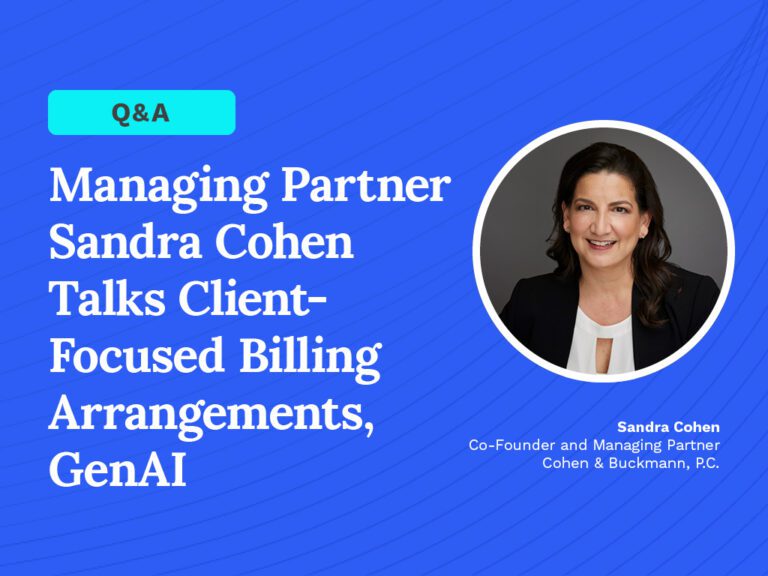Managing Partner Sandra Cohen Talks Client-Focused Billing Arrangements, GenAI
March 14, 2025

An internationally recognized executive compensation attorney, Sandra Cohen is an authority on navigating complex, multifaceted and novel employment changes. She is co-founder and managing partner of Cohen & Buckmann, P.C. based in New York.
In this exclusive interview with Today’s Managing Partner, Cohen & Buckmann Managing Partner Sandra Cohen talks about client-focused billing arrangements and how her firm is using AI in legal practice.
The billable hour model poses a significant challenge for law firms. Could you discuss the advantages of transitioning away from it and toward alternative fee structures?
Sandra Cohen: A firm’s approach to billing, whether hourly, fixed-fee, retainer, etc., must be focused on the client and what works best for them. That is at the heart of our approach at Cohen & Buckmann: How do we ensure we are providing value to clients while also charging appropriately for our knowledge and experience to sustain the business? For us, that’s led to some serious thinking about how to evolve our business model and begin moving away from the traditional billable hour where it makes sense.
Billing is about an exchange of value. Clients are not paying just for an hour of my time. Rather, as their employee compensation and ERISA [Employee Retirement Income Security Act] attorney, I provide clients the benefit of the thousands of hours I have spent talking to other CEOs and the hundreds of transactions I’ve participated in. This provides me with the judgment, coaching, and practical insights I offer. What we have to ensure is that the way we bill for this experience aligns with a client’s needs and expectations. While many clients want an hourly model, we don’t impose a rigid structure on this; instead, we partner with each client to determine a model that will serve them best.
There will always be tension between how law firms want to price their work and what the market will sustain. That’s inevitable. Focusing on providing value, however, is central to our thinking on billing arrangements. That may mean transitioning into value-based billing, which, to some extent, already happens. Our hourly rates naturally increase with our experience and as our practices become busier, which means some level of value billing is already built into what we charge. A common criticism of hourly billing is that it seems that the lawyer is incentivized to just bill more time. That criticism is unsustainable if the law firm is focused on the value exchange (“How much should this service cost, compared to other similar services, compared to the marketplace and based on the results?”), and not just how long it takes.
This discussion, of course, is not new. Firms have been grappling with how to bill for decades, and the issue comes up again and again. No firm or managing partner will develop the perfect solution that provides the final word on the issue. However, a value-forward client service mindset will help ensure the right balance is struck more often than not.
And, in the end, that’s what it’s all about. If a client is not happy with the quality of work received, they will find another firm. No amount of tinkering with the billing model will change that fact.
What role has technology played in client-focused billing arrangements? It has definitely contributed to greater predictability and standardization by enabling the use of templates in various processes, which helps establish consistent billing practices.
Sandra Cohen: I believe our clients want to understand market standards. When they ask us to review a contract, they don’t just want to know what’s in the contract before signing it; they also want to know what might be missing from the contract that should ideally be included. This is where our expertise comes into play. I think AI and other technology can assist us in determining what the market looks like. If we can quickly analyze data from our thousands of transactions, for instance, we can identify the range of variables for different contract clauses or amounts to be paid. Technology could significantly enhance our ability to draw insights from our own data.
In terms of our practice management system, it’s my favorite daily tool. Even though our firm seems niche, we have various practice areas. We assist clients with different needs, such as advising on equity plans or pension plans, and these clients often have distinct profiles.
The practice management system generates reports that provide insight into how our lawyers are performing, what they are working on, their billing activities, the status of open matters, and the number of new cases. We can take the pulse of our law firm at any time and see what we are engaged with. While this system gives us useful historical data, I wish it could also highlight trends more effectively. However, it does allow us to see what new cases have opened, the industries they pertain to, and the types of matters involved.
Since we’re talking about technology, could you discuss further how generative AI is impacting the operations of your firm? Do you view it primarily as a tool for efficiency, a disruptor, or both?
Sandra Cohen: AI technology is impressive. I’m still learning about it, too. I don’t think any of us are truly experts, so I’m trying to educate myself about how generative AI will help law firms.
My real value as an attorney doesn’t lie in drafting summaries or board minutes; as I’ve said, technology can handle those tasks. My value comes from helping our clients find peace of mind. We guide them on what to worry about and what isn’t worth worrying about.
So, I don’t believe AI is going to replace our jobs. Instead, I’m looking forward to using it, although I think we need to adapt quickly, perhaps even quicker than I currently am. That’s why I place it in the challenge category. I haven’t encountered a single managing partner who has it all figured out; many are investing substantial amounts, while some are in the “wait and see” mode. I would classify myself as being in the “let’s dabble” category. I don’t want this opportunity to pass us by, but I also don’t need to be the first one out of the gate.
How is your firm using it?
Sandra Cohen: We are currently using AI tools cautiously. The most important thing is to encourage lawyers to experiment with these technologies. Whether it involves asking a question to ChatGPT or utilizing it for marketing purposes, there are many possibilities. For instance, it can create a first draft of a blog post quite effectively, which we can then refine and fact-check. As lawyers, we are risk-averse and will carefully review any content it generates, ensuring that it reflects our voice and style.
Right now, we are using AI to summarize. For example, we can summarize the termination provisions in an option plan. First-year lawyers typically do this work, but they still need to learn how to perform these tasks themselves. While they can’t rely solely on ChatGPT, its use could disrupt certain routine areas of law to some extent.
There are also many opportunities for other professionals in the industry. As a small firm owner, I expect my vendors to offer AI solutions. This includes my practice management software, which has an AI tool that isn’t fully developed yet. Similarly, we subscribe to services like Bloomberg, Practical Law, and Thomson Reuters, which address security concerns. Their tools focus on their own database of cases, like those from LexisNexis. I feel more comfortable using tools from these larger providers because they have the resources to invest in development. While they may charge a premium now, I believe the price of information will decrease over time.
Some drafting tools show great promise, although I have only tested a few. For example, one tool could help make revisions that take the provisions of an employment agreement and adjust it to the party’s interests: to make drafting suggestions so that the contract is more favorable to employers vs employees, or vice versa. It can identify your client’s profile and suggest relevant clauses such as indemnification clauses. This could be useful for contract drafting, and I anticipate that we will begin adopting these tools more frequently in the next year. I don’t think managing partners can afford to wait two years to embrace AI; that timeframe is too long. We need to start experimenting with these tools in the next six to twelve months, even if we’re not perfect at it yet.
Get the free newsletter
Subscribe for news, insights and thought leadership curated for the law firm audience.




